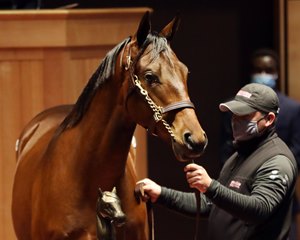Fasig-Tipton October Sale Continues at Stable Pace


The Fasig-Tipton Kentucky October Yearlings Sale hummed along at a measured pace during the Oct. 27 second session, with overall numbers mirroring last year's pre-pandemic auction.
With a son of Quality Road leading the way with a new sale-topping $560,000 price tag, Fasig-Tipton reported 241 yearlings sold for $7,996,600, an average price of $33,181, and a $15,000 median. The 62 horses that went unsold represented an RNA rate of 20.5%.
Cumulatively, from 776 yearlings cataloged for the first two sessions, 489 yearlings have been sold for gross receipts of $16,390,500, for a $33,518 average and a $15,000 median. The cumulative RNA rate is 21.3%.
At the same point a year ago, 500 yearlings had been sold for $19,199,100 at an average of $38,398 and $15,000 median.
"There was solid trade again today, with a very respectable RNA rate," Fasig-Tipton president Boyd Browning Jr. said, adding that the buying bench has been diverse. "The average is down slightly from last year at this point, although not dramatic. There has been a legitimate marketplace that's been fair for both buyers and sellers. There would be no significant gap between the leading buyer and the 10th leading buyer in terms of activity. One of the concerns I had that has proven to be unfounded thus far is the participation from our foreign customers who buy a lot of horses in the under $20,000 range and there seems to have been strong participation at those levels.
"Credit for the buy-back rate goes to the sellers for being realistic in their expectations," Browning continued. "Consignors and agents have educated their principals to the realities of the marketplace and there are horses that continue to get sold post-sale."
Through the first two sessions, 43 yearlings have been sold via the internet. While those who purchased yearlings via the internet might have had on-site representatives or made their winning bids via phone without the virtual option, Browning said it's clear that the format has resonated with buyers.
"Clearly people are comfortable participating via the internet and it's another way to provide bidding opportunities and options for those wanting to participate in that fashion," Browning said.
The session-topper, an Ontario-bred colt consigned by Anderson Farms, agent, was purchased by Eclipse Thoroughbred Partners. Produced from the stakes-placed Bernardini mare Pearl Turn, the colt is a half brother to Gretzky the Great, a precocious son of Nyquist who won this year's Summer Stakes (G1T) at Woodbine.
Based on sales volume on-site and via online and telephone bidding during the first two days of the four-day auction, there appears to be little, if any, residual effects from COVID-19 on the October marketplace.
"I think it's more of the same," said Andrew Cary of Cary Bloodstock. "If you've got a horse that everyone wants, there is still a lot of competition for them. If you've got the right sire, the horse vets good and is an athlete, there is still a lot of demand. They may be bringing a little less than in normal years. Maybe an average horse is more discounted than usual. If there is anything negative on the vetting, there are enough horses available that people can wait for the next one. Having clean vetting on the selling side is critical."
Whether pandemic related or not, Cary said there is value to be had at the October sale.
"There are some good buying opportunities," he said. "Buying early always helps. I bought a Frosted filly with a nice pedigree for $35,000. I thought she was a good value. She was a little early in the sale and a May foal. There are some diamonds in the rough out there. I bought a Maclean's Music filly for $100,000 that is very nice, a great athlete. I thought that was a fair price and I don't know if she would have brought more in another year."
With the October sale the last yearling auction of the season before the market moves on to mixed sales, breeders are more likely to have lower expectations and willing to settle for less than they would at other times in order to generate cash flow, Cary said.
"There are a lot of breeders who don't want to offload them, but they kind of have to because they have mares with babies in their bellies and stud fees to pay for next year," he said. "You can't keep them all so at some point you have to cut a few of them loose."
The October sale continues through Thursday, with sessions beginning at 10 a.m. ET.
